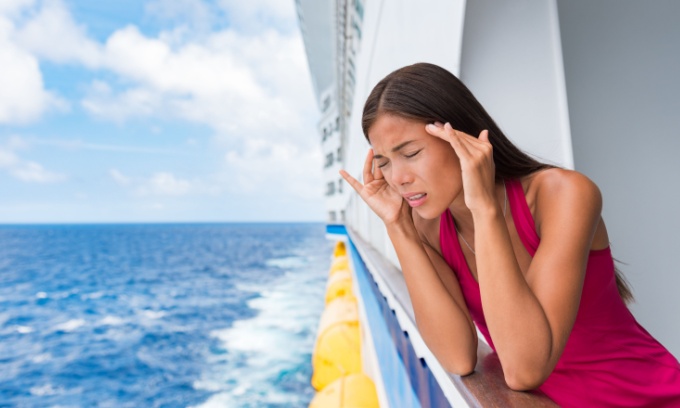Cruising is a fairly stress-free way to travel – amazing sights on the land during the day, fun activities to keep kids and adults relaxed during the afternoon, and you have somewhere already arranged to sleep every night. But for those who have never spent a lot of time on ships, ferries, or even dinghies; how can you know that a bout of seasickness isn’t going to ruin your week long trip around Fiji? And what can you do if it does?
Related: Family travel insurance: How does it work?
The science behind why we get sick
Why does our body try to reject breakfast when our environment is moving around more than we are? It’s actually an ancient survival tactic.
When your eyes are saying one thing – “we’re standing still” – and your ears and feet are saying another thing – “we’re moving” – then your brain freaks out. This causes a temporary dysfunction in your brain’s balance centres suggests Ric Day, a Professor of Clinical Pharmacology at the University of NSW. The brain then responds by making you feel dizzy and nauseous. This is your brain’s way of sending the message, “Danger! Remove yourself from this situation immediately.”
From a natural selection point of view, this makes sense to our species’ survival. If something makes us feel sick, we don’t do it again. But in the case of something enjoyable like a cruise, we’re going to try and struggle through the nausea so that we don’t miss out on our holiday. Thankfully there are ways to counter seasickness, as well as tips to avoid getting seasick in the first place!
Will I get seasick on a cruise?
You don’t need to worry about the possibility of seasickness unless you have a bad history with motion-sickness. The vast majority of people never get sick on a cruise, for two reasons:
The first is that cruise liners have the benefit of sheer size, meaning they are impacted less by waves. The second is that cruise liners also come equipped with large stabilisers, which are underwater wings that are computer-controlled and counteract the motion of the sea.
Just remember, everybody takes a while to acclimatise to being on a cruise ship. Even big ships go up and down slightly with the water, so you still need to learn to walk more deliberately than you do on land. This is known as “getting your sea legs”.
Read More: Travel insurance for cruises
Do you get motion sick in other vehicles?
A good test to know whether you will get seasick – if you haven’t been on a boat – is to ask yourself whether you’ve ever gotten motion-sick in a car, bus, train, or even an aeroplane. Some of the less terrifying roller coasters can also give you a good indication of how your body might respond. If you don’t tend to get sick in vehicles, then feel reassured that you probably won’t suffer terribly from seasickness.
If you’ve ever gotten motion-sick before, you can figure out any of the key factors that may have caused it and avoid the same type of situation on your cruise. Maybe you read a book instead of watching the horizon, or maybe you ate a big meal before sitting in the hot sun in the passenger seat for a long road trip..
Popular methods for preventing and treating seasickness
- Keep an eye on the horizon: The easiest way to reassure your body is to look at the horizon, as it’s a fixed point. This helps your balance centre stabilise and will calm brain-induced seasickness. Closing your eyes works equally well, since your eyes then can’t disagree with your ear/body balance senses. Scientific studies have proven that looking at a far-away object helps to retain balance. While on land, you should choose something close by to focus on.
- Get some fresh air: Go outside on a lower deck and take some deep breaths. Cool, fresh air can help counteract your brain’s attempts to raise your body temperature and can ease the feeling of nausea.
- Move around: If you start walking around, your whole body will once again be in agreement that you are moving, and the nausea will fade.
- Achieve a lower centre of gravity: If there are any spare rooms, ask the crew if you can be moved to a lower deck. This puts you closer to the centre of gravity of the ship, where the rocking motion is much less. The rocking is worst in the bow (front) or stern (back) of the ship on the top deck.
- Acupressure wristbands / Biobands: These are wristbands with little round buttons on them that you press against your wrist pressure points. This pressure apparently “reassures” your nervous system. They are available from any chemist.
- Eat some ginger: Bringing some ginger candy to chew or ginger ale/beer to drink may help alleviate seasickness.
- Have some food or water: Drinking water will usually calm a nervous stomach, but take small sips more often, rather than gulping down a litre all at once. The same applies with food – small snacks more often will be tolerated better than an all-you-can-eat buffet three times a day. What to eat? Dry crackers, green apples, and lemonade are all home remedies with a solid track record.
- Avoid alcohol: Alcohol will confuse your balance centre, which increases the feeling of nausea, as well as dehydrating you.
- Look into medication: Travel sickness medications available over-the-counter at the chemist include the antihistamine compounds Benadryl, Dramamine, and Meclizine. Take them before you get on the ship; being proactive with motion sickness is approved by doctors. You’ll probably get used to the ocean in a day or two and can stop taking the medication. In extreme cases the ship’s doctor can give you prescription medications, which they will charge you for.
- Sleep it off: Take a drowsy antihistamine and sleep it off. Unfortunately, this means you’ll sleep through some of your cruise.
Cover image source: Maridav/Shutterstock.com








